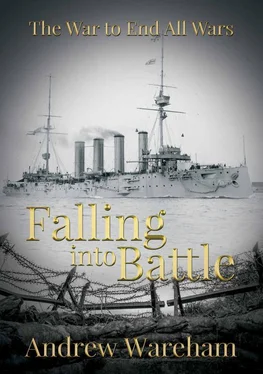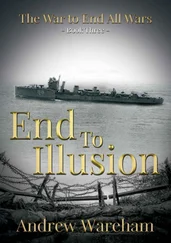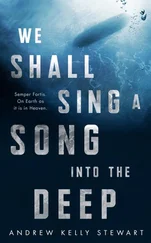“Are you bound for London, sir?”
“Not me, Sub. Family home is in Norwich, bit outside, actually. Convenient sort of place for this posting.”
The Dorchester had a room, deciding that Simon looked of the right sort and that they should encourage him while still young – he could be a client for another fifty years.
There was a lot to do in London for a lonely young man seeking activity so that he need not feel how isolated he was.
He ventured into the shopping areas, to Oxford Street, which he had heard of, where he went so far as to buy a book, a thriller, ‘The Riddle of the Sands’, to take back with him. It was all about German spies in the North Sea, he gathered, and should be a good read. He would leave it in his cabin in the depot ship where he slept in harbour; it was dry there.
While he was shopping, he spotted a pair of binoculars in a window and wandered inside to look at them – his own glasses might be useful on the bridge. The store had a massive display of useful military accessories inside, including any number of different pistols, both revolvers and automatics, selling as officers’ sidearms. The field glasses interested him most and he finally spent a huge fifteen pounds on a pair of naval binoculars made by Carl Zeiss of Jena. He was mildly irritated that he had to buy from Germany, but he would probably be using them against their makers.
There was music hall and shows for the evenings and the sights to see during the day – he did not know London, had never lived there. He took his train back to Harwich, refreshed and ready for anything the Navy could throw at him. Only as he sat back in the comfort of first-class did he become aware that he was looking forward to a conversation when he got back – he had talked to nobody in the four days he had been away.
“Take her out, Sub.”
“Sir.”
Simon had not expected the order but was not fazed by it – he knew exactly what to do, had watched and learned and knew just where the current would catch the stern as they worked out of the destroyer moorings in the creek. Sheldrake held precisely to the channel as they moved out, saluting the two light cruisers in port and adhering to the set speed for manoeuvring as laid down by the harbour regulations.
“Very tidy, Sub! Couldn’t have done better myself. My watch. Secure forecastle and get below, Sub.”
The captain took a watch, there being only the three deck officers, commissioned gunner not a seaman watchkeeper but on twenty-four hour call to his guns. Mr Harker was as busy as any, training his crews and maintaining his weapons, keeping them clean and shiny and always ready for use, but he could not navigate or keep watch, not officially at least, where he might be seen.
“Boiler-clean and repairs in the yard in April, Sub. Three weeks off. Chief ERA Mason will remain with the ship. We are away. What will you do?”
“I hadn’t thought, sir. Three weeks – that’s a long time… Take a holiday.”
“Think about it.”
Simon did as he was told – he had no idea at all of what he might do on a holiday. He had made no particular friends in the flotilla and those he knew casually would not be on leave at the same time. He did not want to hang around in London, that was a place for weekends. There were placards on the railway station, advertising the Yorkshire Moors and the Lake District – parts of the country he did not know. The Scottish Highlands, as well - healthy, outdoor hiking… He did not know that was his idea of fun, he had tried it on Exmoor and thought that another set of hills might be much the same. What about Paris? That was said to be a fine place for a holiday. The other officers had said that every young man should see Paris; they had nudged him when they said it.
It was easy to book a ticket from Harwich to London, changing there to the Boat Train and the cross-Channel ferry and another train direct to Paris. The railway company arranged hotels in Paris for a small fee – all done for him. He packed his suitcase and set off on the appointed day – the navy having not changed its mind and left him stranded, money paid and leave postponed. He was well off for cash, there being little to spend on in Harwich, and took a large sum with him, ‘just in case’, though in case of what, he was not entirely certain.
The travel was comfortable and the hotel well towards the centre of Paris, in the middle of the attractions. He had been in the lobby for a bare two minutes, discovering the directions to the Eiffel Tower, which he had been told he must see and mount, when a young lady who happened to be there found that she was walking in the same direction and volunteered to show him the way. She was a very pretty lady, dark-haired with huge brown eyes; he thought she was much the same age as himself, and he was very willing to accompany her, not noticing the grins of the lobby clerks.
Her name was Jacqueline, he soon discovered, and she also was visiting Paris, living as she did in the South, in Nice, and just occasionally visiting the capital. She had learned English in school, she told him, so it was lucky she had met him. By another coincidence, she was to remain in Paris for the next three weeks. They spent the day looking at the sights and ate in a pleasant little café she happened to have heard of and then walked back to the hotel. He did not quite know how they came to end up in bed together, but found he had no objections at all. A few days and he began to have suspicions, because she did seem to know much more than he did between the sheets – but he was enjoying his holiday far too much to say so. He paid all of their expenses, naturally, and covered the occasional bill from a dress shop and eventually found, not by then to his surprise, that she had no intention of exchanging letters with him when he left. She thought he was generous indeed when he pulled one hundred sovereigns from his suitcase as he packed to go home. They parted the best of friends, each gaining much that they needed from the experience.
“You will become an admiral, Simon. Au revoir!”
He did not say what he feared she might become but gave her the happiest of farewells.
“Good time in Paris, Sub? Wipe that grin off your face, young man, and don’t tell me what you have been doing!”
Lieutenant Dacres was inclined to be envious. He had gone to the family home and had behaved decorously. The family was big in the county and had a good name – the sons were not permitted to roister where they might be seen. He listened to the opinion of leading figures of the locality and had returned convinced, however, that war was a certainty within the twelvemonth.
“Captain’s pushing for a pair of machine guns, Sub. Might not be able to get Vickers guns fitted, but there are these new Lewises, you know. Lighter guns that can be mounted on a pintle and manned by one man. They use pans rather than belt feed – far easier to handle. Close range only, but useful over a cable or so. What do you say, Mr Harker?”
“On the bridge wing, sir, high. Could be handy, particularly for dealing with gunboats and that sort of thing. We need more firepower, sir. Could be right for seaplanes, sir.”
“Seaplanes? In the air? Surely not! What would they do?”
“Drop bombs. Carry a gun, sir, and rake the deck. Planes are getting bigger and more powerful every day it seems, sir. They have formed a Royal Naval Air Service, you know, sir. Balloons and heavier-than-air craft, sir.”
Lieutenant Dacres was not sure that there was any future in the air, but there had been much talk of Zeppelins and he had heard of the RNAS, though he had no intention of getting in any way involved there himself.
“Nor you, Sub, if you are wise. No career there, young man.”
“Not for me, sir. Feet firmly on the deck, sir. Have any additional orders come through in preparation for war, sir?”
Читать дальше












